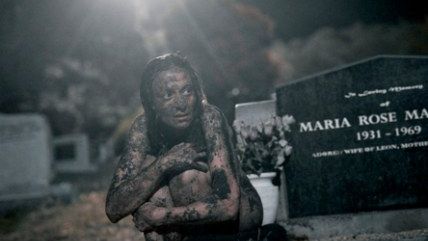Australian Zombie Drama Takes Decidedly Different Journey
Glitch joins some others in not presenting the undead as mindless brain-eaters.


Glitch. Available now on Netflix.
Check your metabolic privilege, breather. Not all zombies are desiccated, intestine-dragging, brain-eating ragamuffins. In French television's 2012 Les Revenants and the 2015 A&E remake The Returned, reanimated corpses on missions of reconciliation and revenge were cute as bugs and no meaner than your average reality-show contestant. And the most-bootlegged unsuccessful pilot in Hollywood history was for a proposed 2007 CBS series called Babylon Fields, starring Amber Tamblyn, in which the zombies were presented as the next stage of human evolution, complete with undead super-libidos.
Joining the zombies-are-people-too club is Glitch, an oddly engaging little show from Australian television now streaming on Netflix. Though its opening scene—naked corpses (Aussies apparently prefer their interments commando-style) clawing their way out of a rural graveyard under a full moon—gives every indication of being yet another homage to/ripoff of George Romero, all bets are off the rest of the way.
For one thing, there's no suggestion that the reanimation phenomenon is taking place anywhere but Yoorana, the country village better known to locals as "the ass-end of the ass-end of the world." Nor are all the dead returning, only a handful.
They arise without being able to remember anything at all, even how to speak. But their memories improve with time (the breakthrough is especially quick for the thirst for beer), and clues to their identities emerge, though without shedding much light on what's happening.
One craggy old man, glancing at a statue of the Yoorana's 19th century founder, exclaims, "That's me! I'm the fookin' mayor!" Another turns out to be an Italian immigrant, shot while escaping a World War II detention camp. For some, recognition is much quicker: A cop called to the cemetery to investigate what he assumes is the aftermath of an all-night bender is stunned to see his wife walking toward him, two years after he buried her.
The cop's reaction—following a short burst of violent denial, he takes his wife to their old rendezvous spot in a park, where they lie on their backs and gaze at the stars—is a big part of what makes Glitch an interesting piece of work. Yoorana's living, confronted with the impossible, shrug in stoic acceptance and make the best of it. A doctor, told the patient she's examining died years ago, replies that that was then, this is now: "I've taken this woman's blood pressure, and she's not dead." The dead themselves seem scarcely more disturbed. When the cops ask one woman—who has just awakened, mossy and muddy, in an open grave—if she can remember her name, she tartly replies: "What business is it of yours?"
This matter-of-fact acceptance of the absurd or impossible has long been an element of Australian comedies, particularly Wilfred, in which a morose young lawyer awakens from a suicide attempt to discover the neighbor's puppy now appears to him as a conspiracy-minded man ("Why do you think no dogs died in the Holocaust? Because we knew it was coming!") in a dogsuit. Uncertain whether he's in grips of a drug-induced hallucination, a prolonged death rattle, or some sketchy version of the hereafter, the lawyer just decides to go with the flow.
Glitch adapts the formula to drama with considerable success, with help from a capable cast of Australian TV veterans, including Patrick Brammall and Emma Booth as the policeman and his zombie wife.
That doesn't mean Glitch isn't spooky. What summoned the dead back and why remains a mystery, only deepened by some spectacularly grisly evidence that their new-found health isn't necessarily permanent.
And there are domestic complications, too, as the dead learn that, despite assurances from their spouses, love isn't usually eternal. "When someone you've already said goodbye to comes back in your life," muses the cop, "what does it mean?" Nothing good.


Show Comments (23)